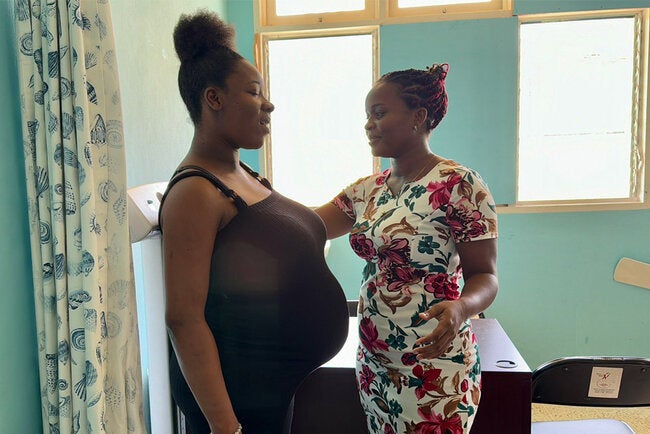
Bridgetown, Barbados, March 27, 2025 (PAHO/WHO)-in an ambitious movement to combat the transmission of mother diseases to children such as HIV, syphilis, hepatitis B and Chagas disease, 15 Caribbean nations join under a project funded by the United Nations Development Fund in India and implemented by the Pan American Health Organization (Pah).
This initiative focuses on strengthening the elimination of mother’s transmission to children (EMTCT) plus the framework within maternal and child health services and aims to eliminate the transmission of infectious diseases of infectious diseases in the Caribbean member states.
Despite the significant progress made to eliminate HIV transmission and mother’s syphilis to the child, the challenges remain. For HIV, the global objective is to reduce the transmission rate from mother to child to two percent (2%) or less. However, in some regions of the world, rates continue to exceed this objective, indicating the need for intensified efforts. Similarly, in the Caribbean, advances towards the elimination of congenital syphilis are evident, however, in some countries the informed rates are as high as 1.8 cases per 1,000 living births, significantly higher than the global elimination objective of less or equal to 0.5 new cases of mother syphilis transmission to children by 1,000 living births.
«The Caribbean has a story of sharing and learning from each other,» said Dr. Rhonda Sealey-Thomas, deputy director of Paho. «Through South-South cooperation, we hope that the Member States of Caricom who have achieved the certification of disease elimination and those who work towards achievement, share their experiences and lessons learned as part of our efforts to strengthen the EMTCT strategy and support other countries to achieve this important objective.»
In the heart of the project strategy there is a commitment to improve maternal and child health services. By focusing on strengthening leadership within these services, improving diagnostic capabilities and improving surveillance systems, the initiative aims to address the gaps that have hindered progress towards the elimination of the disease.
Knowledge exchange stands out as a key component, creating an integral practice of practice for Caribbean countries to discuss successes, challenges and innovations through the support of countries in peers. «The project will improve the elimination efforts between the 15 Caribbean countries, which will support them in the movement as one, while guaranteeing the right of each child to be born and will remain free of HIV and syphilis and other infections transmitted perinatal,» said Dr. Julio Sabido, Executive Director, Ministry of Health and Welfare Belize that successfully submitted the project at the base of the Member States of Caricom.
«Together, as the Caribbean nations acquired knowledge, we share experiences and improve the competences of medical care providers for an efficient and sustainable EMTCT Plus program. This approach accelerates the adoption of effective health strategies throughout the region and encourages a sense of solidarity and collective responsibility.
This project will emphasize technical systems, particularly in the improvement of laboratory services and data collection systems. Reliable diagnosis and effective surveillance are fundamental for the achievements of the project objectives. With the objective of taking advantage of the collective experience and resources of the region to ensure that future generations are born free of these communicable diseases, the project seeks to guarantee the availability of quality diagnoses, primary prevention, treatment services and a solid health information system to monitor cases, demonstrating a comprehensive and sustainable approach to achieve EMTCT more certification.
The project that began in 2025 is expected to emphasize the exchange of good practices, experiences and lessons learned from the EMTCT of HIV and syphilis. The initiative to eliminate Paho’s disease seeks to end more than 30 communicable diseases and related conditions for 2030 in the region of the Americas, including HIV transmission and mother -to -child syphilis.
The director of Paho, Dr. Jarbas Barbosa, welcomed the initiative and its impact on improving the health of women and children in the Caribbean. «Guarantee integrated high quality health services is a crucial part of the PAHO disease elimination initiative, which seeks to eliminate 30 related diseases and conditions from the region of the Americas by 2030,» he said.
About the Pan American Health Organization: He Pan American Health Organization (PAHO) It works with the countries of the Americas to improve the health and quality of life of its population. Founded in 1902, it is the world’s international public agency. It serves as the WHO regional office for the Americas and is the Specialized Health Agency of the Inter -American System.
PAHO’s subregional program He is responsible for providing subregional technical cooperation and strengthening Paho’s commitment to the Mechanisms of subregional integration of the Caribbean, the Caribbean community (CARICOM) and its various bodies and organs; and to build synergistic associations with the Western Indies (UWI), among others. Paho’s subregional technical cooperation focuses specifically on public health issues that would benefit from economies of scale and for which the agreement on collective responses and actions would produce a much greater impact instead of the responses of individual countries. The subregional program also plays a role in coordination between the different offices of Paho Country,
Contact
PAHO/OFFICE OF THE COORDINATION OF THE SUBEGTIONAL PROGRAM (CARIBE)
Lisa Bayley – bayleylis@paho.org






